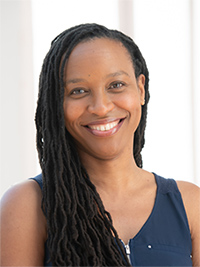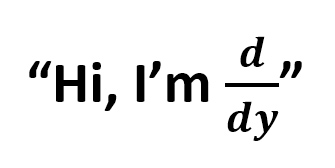
Sybil Prince Nelson is an Assistant Professor of Mathematics at Washington and Lee University, Virginia, USA, specializing in Biostatistics and the intriguing intersection of mathematics and music. As an active researcher, she has made significant contributions to understanding the application of tree-based models in disease prediction, specifically focusing on genetic and environmental interactions. Dr Prince Nelson's innovative pedagogical methods, which integrate artificial intelligence (AI) and problem-solving challenges in the classroom, have been presented at several conferences, including the Mathematical Association of America Conference. Beyond her academic pursuits, she is also the author of several fiction novels.
1. What’s your earliest memory of doing mathematics?
I think the most memorable moment was when I was in elementary school and I was chosen to participate in a weekend math camp at a local school called Bethune-Cookman College. Each weekend, the selected students would go to campus and we would be taught the most interesting things. I distinctly remember learning about quadratic formulas and feeling so special when I understood them.
2. How has mathematics education changed in the time you have been involved in it?
When I was an undergrad getting my bachelor’s in mathematics, I distinctly remember not being able to use calculators. We did everything by hand even though we had access to calculators. I think professors were afraid to integrate them into their classes perhaps thinking that students really wouldn’t understand the material and just rely on the calculator. But now, we have so much more technology than just a calculator. This technology can actually help students learn math in more sophisticated and in-depth ways. I often use tools to help illustrate ideas and I even use AI tools such as ChatGPT in my classroom.
3. Tell me about a time in your career when something totally flabbergasted you.
Honestly, the things that ChatGPT can do completely flabbergasted me. You can give this AI an entire AP calculus test and it will get a 5. So, it got me thinking, am I just turning my students into slower and less accurate machines? I have shifted my teaching from just having students find an answer to teaching them how to think in ways that an AI cannot. Why will an employer hire you if a machine can do the same thing and faster?
4. Do you practise mathematics differently in company?
Not really. I do enjoy working math with other people since it gives me ideas for how to solve something or what could be my next project. But sometimes I do like to sit alone, with very loud music, and struggle through an idea.
5. Do you think a brilliant maths teacher is born or made?
I think you have to be born with the desire to help people, but beyond that, everything else can be taught. I definitely think I have become a better teacher over my seventeen years of teaching due to researching pedagogy and attending conferences on best practices. When you have the desire to teach, you find ways to make yourself brilliant.
6. What’s the most fun a mathematician can have?
Personally, I love terrible math jokes. Those are the best. And they are even better when I tell them to my students. I hear the groans of annoyance, but I know deep down they love my sense of humour, and it helps them relax in the classroom. And when everyone is relaxed in a classroom setting, the room really comes alive.
7. Do you have a favourite maths joke?
e^x and a constant function are walking down the street. All of a sudden, the constant function gets a panicked look in its eyes. It runs away and ducks into an alley. e^x follows it and says: “Hey, what’s wrong? What’s got you so scared?” The constant function says: “I just saw a differential operator coming towards us. If it sees me, I am gone!”. e^x says, “Well, I’ll be fine. I’m e^x” and decides to keep walking. It comes across the differential operator and says, “Hi, I’m e^x.” The differential operator says 
Join the conversation: You can tweet us @CambridgeMaths or comment below.